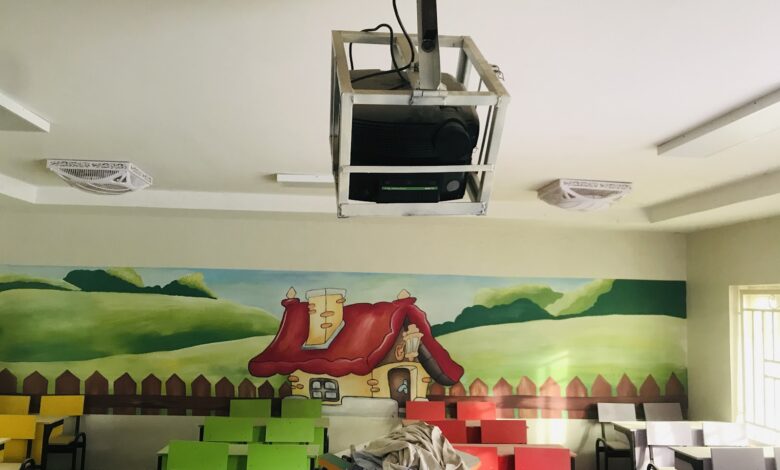High-Tech Teaching Aids In Borno Gather Dust Despite Multimillion-Dollar Investment
During recent visits to various schools in the state, HumAngle confirmed that none of them utilises the teaching aid.

The government of Borno state in northeastern Nigeria spent millions of dollars about a decade ago to purchase 500 K-Yan teaching devices and train 40 teachers in India on how to use them. But this investment has gone to waste as the items suffer neglect across different schools.
The Boko Haram conflict has deeply affected the education sector in the northeastern region, resulting in the loss of more than 2,295 teachers and the destruction of over 1,400 schools since 2019. As a consequence of this conflict, 1.3 million children in Borno continue to grapple with obstacles in accessing quality education, rendering them among the most disadvantaged in terms of education globally.
Between 2012 and 2019, the Borno state government embarked on an ambitious initiative to construct ‘mega’ schools equipped with facilities such as air conditioners and digital teaching aids. Among these teaching aids was the K-Yan, an advanced made-in-India technology intended to enhance group learning experiences.
According to former governor Kashim Shettima, all the 44 mega schools built in the state are able to accommodate at least 1,200.
The K-Yan, short for Knowledge Yantra, combines various functions, including a computer, projector, TV tuner, audio system, optical drive, and smart board with a digital pen. This multimedia device aims to revolutionise the teaching and learning experience by granting access to internet resources, cloud content, interactive teaching tools, and ample storage capacity for educational materials storage.
The device is capable of transforming any flat surface into an interactive board for various uses in the classroom.
In 2013, the Borno state government approved a contract for the purchase of 500 K-Yan projectors and sent 40 teachers to India for specialised training on how to operate and maintain the devices. The objective was to introduce digital education in the state, elevating the quality of teaching amidst the ongoing educational disruptions caused by the conflict.

Given current price estimates, the purchase of the projectors would have cost about $800,000. In 2017, Shettima disclosed that an additional $3 million was spent on sending teachers to India for capacity building.
Despite the substantial investment, the potential of this technology remains largely untapped. The envisioned shift to digital education, especially in light of the widespread educational disruptions due to the conflict, has yet to materialise.
In 2019, the current Borno state government inherited 44 mega schools, some of which had classes equipped with the K-Yan teaching aid. During recent visits to three schools — Dangote Primary School, Aisha Buhari Integrated School, and Bulumkutu Mega School — HumAngle observed that none of them utilises the teaching aid.
Teachers at the Mega Schools expressed disappointment at the underutilisation of the K-Yan projectors.
“I have been seeing this device hanging in some of the classes in the school since I started working here. I have never seen the school use it. I thought it was just a projector until now that you told me about it. I only believed you after I saw K-Yan written on the device,” said a teacher at the Bulumkutu Mega School who asked not to be identified.
Another teacher stated, “Had the devices been working, we would have achieved more quickly. It would be easier than writing on a board, and the students too would be more attentive to the fun way of using the K-Yan.”
In addition to the abandonment of the devices, the Dangote Primary School has also not been open for lectures since it was commissioned in April 2019. The school was supposed to cater to the educational needs of vulnerable children and boasts of various facilities, including a dormitory, library, kitchen, playground, and stand-by generating set.
“All my hope was tied to this school,” Aisha, who had hoped to enrol her daughters, told us last year. “But now we have lost hope. Sometimes, we feel we have been deceived. It’s four years now. They had better open this school since they said they did it for orphans.”
Efforts to contact the Borno State Ministry of Education for comments were unsuccessful, with correspondence remaining unanswered at the time of this report filing.
Support Our Journalism
There are millions of ordinary people affected by conflict in Africa whose stories are missing in the mainstream media. HumAngle is determined to tell those challenging and under-reported stories, hoping that the people impacted by these conflicts will find the safety and security they deserve.
To ensure that we continue to provide public service coverage, we have a small favour to ask you. We want you to be part of our journalistic endeavour by contributing a token to us.
Your donation will further promote a robust, free, and independent media.
Donate HereStay Closer To The Stories That Matter




